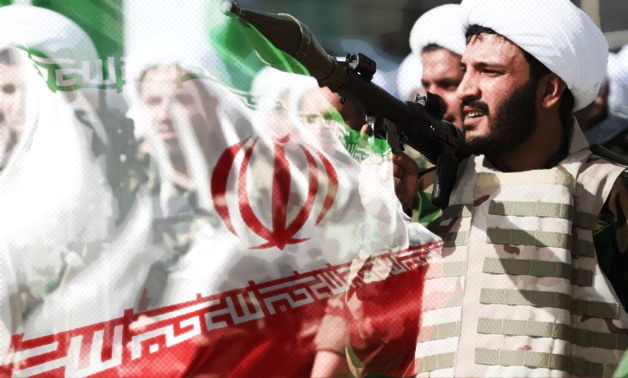
The militias have been accused of committing war crimes, which were motivated by sectarian revenge – Photo by Egypt Today/Mohamed Zain
CAIRO – 18 February 2019: The Iran Militia in Iraq and Syria (IMIS) has revealed plans to relocate most of the group’s offices outside the country’s main cities, including Baghdad.
The IMIS is composed of some 40 militias that are mostly Shiites; originally, the People’s Mobilization Forces, the umbrella organization was formed on June 15, 2014 after top Shiite cleric Ali al-Sistani issued a fatwa on June 2014 that called for defending Iraqi cities against Islamic State (IS) fighters, following the fall of Mosul on June 10.
Forces of the front brought together Shiite militias under direct support and control from Iran, which saw the perfect chance to interfere without any permission to execute its scheme to shift the balance of power in the Middle East.
The militias have been accused of committing war crimes, which were motivated by sectarian revenge. An Amnesty International report said Shiite militias have abducted and murdered scores of Sunni civilians in Iraq in crimes committed in retribution against the actions of IS.
The report, published in Oct. 2014, said the IMIS operate outside any legal framework and without official oversight, and had contributed to a deterioration in security and to the increasing lawlessness in Iraq, Amnesty said.
"Shiite militias are ruthlessly targeting Sunni civilians on a sectarian basis under the guise of fighting terrorism, in an apparent bid to punish Sunnis for the rise of IS and for its heinous crimes," Donatella Rovera, Amnesty's senior crisis response adviser, said.
"By failing to hold militias accountable for war crimes and other gross human rights abuses the Iraqi authorities have effectively granted them free rein to go on the rampage against Sunnis. The new Iraqi government of Prime Minister Haider al-Abbadi must act now to rein in the militias and establish the rule of law."
The Amnesty document included evidence from relatives of those who had gone missing or were killed.
It reported that one family had paid $60,000 to have a family member released, only to find his body two weeks later in a Baghdad morgue, his head crushed and his hands cuffed.
Amnesty also accused Iraqi government forces of serious human rights violations, presenting what it said was evidence of torture and ill-treatment of prisoners, and deaths in custody of Sunni men held under the 2005 anti-terrorism law.
It cited one example of a 33-year-old lawyer who died in custody, his body showing open wounds and burns consistent with the application of electric shocks.
Another man was held for five months and tortured with electric shocks and threatened with rape before being released without charge.
"Successive Iraqi governments have displayed a callous disregard for fundamental human rights principles," Rovera said.
"The new government must now change course and put in place effective mechanisms to investigate abuses by Shiite militias and Iraqi forces and hold accountable those responsible."
Later in April 2015, the then Iraqi Prime Minister Haider al-Abadi said the IMIS will not take part in the battle for Mosul, adding that it is preferable if people in the city take on the task themselves.
He added that his government will prosecute members of the militia accused of violations, including the looting of people’s homes and business properties in Tikrit.
The IMIS has been often accused of acquiring power bases in Iraq and of being Iran’s instrument to dominate Iraq; as of the end of 2016, the organization includes around 142,000 fighters in fifty or so groups.
A report by the Carnegie Middle East Centre said The most powerful groups in the PMF are those that maintain strong links with Tehran and pledge spiritual allegiance to Iranian Supreme Leader Ali Khamenei. As such, they have been groomed by Iran as reliable political and military allies; they, therefore, benefit from greater funding and more supplies from Tehran than other groups in the IMIS.
This pro-Khamenei group includes a number of relatively small paramilitaries that Iran has created, which serve as proxies for Tehran. Their leaders publicly take pride in such affiliations, professing religious allegiance to Ayatollah Khamenei and his notion of vilayat al-faqih (the guardianship of the jurists), rather than to Grand Ayatollah Sistani of Najaf.
The report further added that These groups include, for example, Saraya Khurasani, KH, and Kata’ib Abu Fadhl al-Abbas, among many others. In fact, they are arms of Iran’s IRGC and the Iranian foreign intelligence agency, Itilaat. This faction serves to advance Iranian interests in Syria as well as to protect Iran’s border areas.
“It also wishes to build a corridor for Iran to extend its influence into the Levant. Mostly drawn from Iraq’s outlying Arab provinces extending from Basra in the south to Diyala in the north, these groups serve as a kind of border guard—a sort of Iranian insurance policy against threats on its immediate border.
“But the better known elements of the pro-Khamenei faction consist of local right-wing Iraqi militant wings that have also become political actors. Their military resources—including heavy armor, drones, and military advisers—all come from Tehran.”
Those same militias now want to remain a permanent, independent armed force and are resisting attempts to integrate them into the military or police, the AP found in March 2016.
“Those who sacrificed more are entitled to more,” said Hamed al-Jazaeery, head of the al-Khorasani Brigades militia. “What is written with blood cannot be removed. It is not ink on paper.”
“We want to be a third power in Iraq,” alongside the army and police, al-Jazaeery said. “Why can’t the Hashd be like the Revolutionary Guard in Iran?”
The model of the Revolutionary Guard, often cited by militia leaders, would be a dramatic change for Iraq’s militias. In Iran, the Guard is an elite force independent of — and better armed than — the military, tasked with “protecting” the Shiite cleric-led power structure, AP reported.
Comments
Leave a Comment